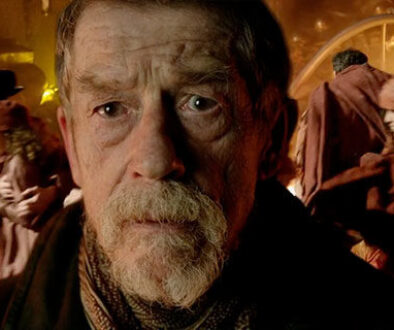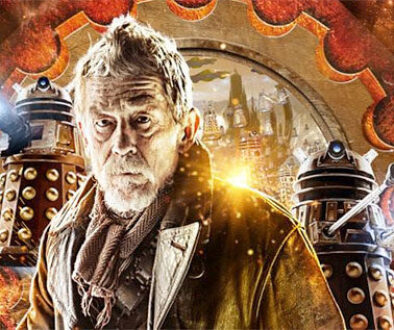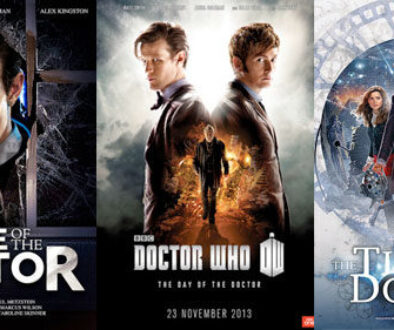Doctor Who: The Monster Collection: Davros Review
Guest contributor Giacomo d. Lee takes a look at the upcoming DVD release featuring Davros.
The most famous villains over the years have to be the Daleks, and as Daleks sell, you’ll find a collection for them and their unnerving creator Davros. To be fair though, in the collection’s first serial Genesis of the Daleks, the Daleks are more of a sideshow in the story. So’s the Doctor himself, in a way. More on that later.
Genesis of the Daleks
From 1975, Genesis of the Daleks finds the Fourth Doctor and his two human companions deposited on the planet Skaro. Usually the Doctor travels where he pleases, but the gang have been given a mission by the Time Lords: Ensure the Daleks never come into existence, or stay forever stuck on the war torn planet.
 It’s a pivotal moment in Skaro’s history, and over six episodes we have the time to be introduced to three humanoid races on the planet: the dark-haired and strictly militant Kaleds, the fair haired guerrillas known as Thals, and the Mutos, deformed residents of the radioactive desert. The current series wouldn’t have enough time to do justice to two species in its customary standalone or two part episodes, let alone three, and it wouldn’t really have the time to cover intricacies like the inner dissatisfaction within the Kaled faction, nor the time to show a companion like Sarah Jane lead the Muto slaves to mutiny as this saga does.
It’s a pivotal moment in Skaro’s history, and over six episodes we have the time to be introduced to three humanoid races on the planet: the dark-haired and strictly militant Kaleds, the fair haired guerrillas known as Thals, and the Mutos, deformed residents of the radioactive desert. The current series wouldn’t have enough time to do justice to two species in its customary standalone or two part episodes, let alone three, and it wouldn’t really have the time to cover intricacies like the inner dissatisfaction within the Kaled faction, nor the time to show a companion like Sarah Jane lead the Muto slaves to mutiny as this saga does.
Yet with all this setting up and exploration, we are left with next to no information on Davros himself. All we know about the star of the show is that he’s a scientific genius. Not once are we given an explanation of his horribly scarred appearance. If we are to assume it was due to a Thal attack, then where are all the other Thal victims? If it wasn’t for Wikis, I’d still be under the impression he was a Dalek creature free of its shell, albeit one with arms and fingers. That’s a pretty big oversight considering six episodes are given to his ruthless scheming and conjuring. Everyone around Davros looks and thinks like a Nazi, concerned as he is with racial purity, and yet Davros himself looks more like a mutant than any of the actual Mutos do!
There’s also a propensity for repetition in these older episodes that we don’t see today. with the Doctor and his companions continuously getting captured and recaptured. Also, Tom Baker’s Doctor is smart or dumb whenever the script needs him to be. Despite getting tortured by Davros and hearing his assertion that he’d happily ‘end everything’ if he had the power to unleash the ultimate virus, the Doctor’s still gullible enough to believe that Davros has brokered peace in the concluding episode. Really, Doctor?
Still though, these are the only faults with a well paced and plotted collection of episodes. The intense and paranoid atmosphere of Skaro is maintained throughout, and there’s some inspired world building in the set, which combines the creaky backdrop of the First World War’s trenches and gas masks with the advanced labs and costumes of the more clinical WWII.
The Stolen Earth
The second serial in the set is set almost entirely on our world, 2008’s two parter The Stolen Earth/Journey’s End. That’s just two episodes, equivalent to four of the classic series, which somehow manage to set up and then dash a terrific sense of momentum.
 The Stolen Earth is a lean masterclass in cranking up threat and tension. In 45 minutes we see the Earth relocated, families and ex-figureheads murdered, a host of old companions return, foreboding premonitions and the premiere of one of the loopiest secondary characters ever in Dalek Caan. Davros is reintroduced after a 20 year gap also, more disturbing than ever (check out the scene where he shows off his ribs). Oh, and spoiler alert – we get the death and regenerative explosion of the Tenth Doctor in its dying minutes. Best cliffhanger ever..! And then?
The Stolen Earth is a lean masterclass in cranking up threat and tension. In 45 minutes we see the Earth relocated, families and ex-figureheads murdered, a host of old companions return, foreboding premonitions and the premiere of one of the loopiest secondary characters ever in Dalek Caan. Davros is reintroduced after a 20 year gap also, more disturbing than ever (check out the scene where he shows off his ribs). Oh, and spoiler alert – we get the death and regenerative explosion of the Tenth Doctor in its dying minutes. Best cliffhanger ever..! And then?
Journey’s End. A bloated effort where the companions are reduced to co-pilots essentially when the Earth is tugged back into place through sci-fi hokum. Where the Daleks become a joke thanks to conveniently placed steering wheels. And the episode still doesn’t have the decency to end there! It drags on with yet another goodbye scene for Rose, the companion who never goes away (who’s back yet again for November’s anniversary special, naturally). And why there’s a half human clone of the Doctor running around, I’ll never know.
That’s the big difference between both stories. I can tell you the plot of Genesis and how it ended. I can tell you the points it raises about genocide, the Daleks being Nazi substitutes etc. But with Journey’s End, I can tell you that Rose gets a new boyfriend, and the Doctor winds up all alone. I have no idea how or why the Stolen Earth is no longer stolen. It suffers too much from a sentimentality for the characters that the post 2010 version of the show has thankfully dispensed with. And yet, much like Genesis, in part one of the story you can really feel the stakes. You see people die, and you think anyone’s dispensable (this after all was a goodbye to the Tenth Doctor’s roster of companions, many of whom have yet to guest star again). In part two, we see a few strangers zapped by a beam of light into nothingness, when really we need to see an old face sacrificed or a few more shots of the ravaged Earth to remind us why exactly Davros and his Daleks are so dangerous to the universe. They haven’t been popular villains for half a century by doing nothing.
With the addition of a clone, there’s way too much Doctor, but in Genesis the Doctor’s more of a tourist if anything. In the old series he isn’t the entire world, but a bystander in an alien world. Even when he gets the chance to show great power, he declines, going through the pros and cons of whether he should commit genocide himself and destroy the Daleks. The closest the modern story gets in this regard is when Davros shows the Tenth Doctor how willing his friends are to destroy in his name, claiming he turns ordinary people into ‘weapons.’ It’s a fascinating point which the rest of the episode neglects to explore. Is Davros really the only monster in this collection? Is he really the only genius with a capacity for destruction? That’s something not to be explored lightly, and I hope the anniversary special does the concept with the justice it fully deserves.
The Monster Collection: Davros is released 30 September 2013.









